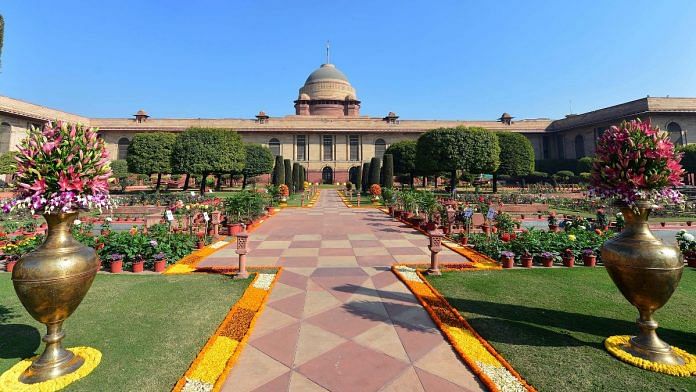President Droupadi Murmu renamed Rashtrapati Bhavan gardens, built in 1929 and known as Mughal Gardens, as ‘Amrit Udyan’ meaning ‘Garden of the Holy Nectar’. The renaming brings back the battle of ideas between shedding a colonial past marked by Mughal invaders and creating a narrative of hostility toward Indian Muslims.
To design the vast gardens spread over 15 acres, British architect Edwin Landseer Lutyens used two different horticulture forms — the English flower garden and the Mughal tradition. According to the earlier description on the Rashtrapati Bhavan website, ‘Amrit Udyan’ was built with inspiration from the Mughal Gardens in Jammu and Kashmir, the gardens around the Taj Mahal in Agra, and even miniature paintings of India and Persia. There was nothing more to the naming, just like Mughal cuisine or Mughal painting.
It is evident that members of the Bharatiya Janata Party (BJP) see the ‘Mughal’ tag as reminiscent of a ‘dark’ history of ‘invasion’.
Welcome and thank Hon'ble @rashtrapatibhvn Smt. Droupadi Murmu ji for renaming the iconic gardens at the President House as 'Amrit Udyan.'
This new name not only shreds yet another symbol of colonial relic but also reflects India's aspirations for the #AmritKaal. pic.twitter.com/mmlmwQDm0o
— Dharmendra Pradhan (@dpradhanbjp) January 28, 2023
The entire act is meant to send out a message that Indian civilisation will not glorify or even retain the symbols of its ‘invasion’ history. How practical this approach is and what purpose it serves is yet to be seen.
Also read: Srimad Muhammad Ghori: orthodox maniac in West Asia, promoter of Sanskrit, Lakshmi coins in east
Relationship with Mughals
Should Indian Muslims be hostile or affectionate toward Mughals? The answer lies in whether they feel a connection with them or not. We need to understand that Indian Muslims are not a homogenous group but comprise the dominant castes and the Pasmandas.
The former see their own history beginning with the Mughals and claim the Persian culture as their own. They don’t consider Mughal rulers invaders like the British but those who came to India and became a part of it. They also distinguish between good and bad Mughals — Akbar is a ‘good’ Mughal who was kind and thoughtful toward Hindus. To these Muslims, the oft-repeated argument — ‘An Indian Christian doesn’t feel hurt if we get rid of a British colonial symbol, therefore an Indian Muslim shouldn’t feel bad about renaming Mughal symbols either — doesn’t make much sense.
On the other hand, Pasmandas who constitute nearly 85 per cent of Indian Muslims bear no connection to the rulers’ class or invaders. An overwhelmingly large majority of Muslims in India are ordinary people whose ancestors were mostly lower-class and caste Hindus.
Indian Muslims who feel affectionate toward the Mughals should re-examine their feelings.
Also read: Mughal history’s biggest puzzle solved by municipal engineer — where is Dara Shukoh buried?
Relationship of unequals
Pasmanda Muslims and the elite rulers have a relationship of the oppressed and oppressor. History is full of stories and evidence of Pasmanda Muslims being denied access to higher knowledge. Political thinker of the Delhi Sultanate Ziauddin Barani wrote in his Fatwa-i-Jahandari that Ajlaf or ‘lower’ caste Muslims should be taught just the basic five pillars of Islam and nothing more. He branded them as ‘mean’ and ‘despicable’ and insisted that the sultan should consider it his religious duty to deny them higher knowledge.
“Teachers of every kind are to be sternly ordered not to thrust precious stones down the throats of dogs or to put collars of gold round the necks of pigs and bears. That is, to the mean, the ignoble and the worthless, to shopkeepers and to the low-born, they are to teach nothing more than the rules about prayer, fasting, religious charity and the hajj pilgrimage, along with some chapters of the Qur’an and some doctrines of the faith, without which their religion cannot be correct and valid prayers are not possible. But they are to be taught nothing else, lest it brings honour to their mean souls,” Barani wrote.
There is nothing for Pasmanda Muslims to find any glory in the legacy of any Mughal rulers or invaders. If there is anything in the past for them, it’s their exploitation. The long fight for equality and social justice for the majority of Indian Muslims will start from home by finding the truth of their own heritage.
Amana Begam Ansari is a columnist, writer, and TV News Panelist. She also runs a weekly YouTube show called ‘India This Week by Amana and Khalid’. She tweets @Amana_Ansari. Views are personal.
(Edited by Humra Laeeq)



